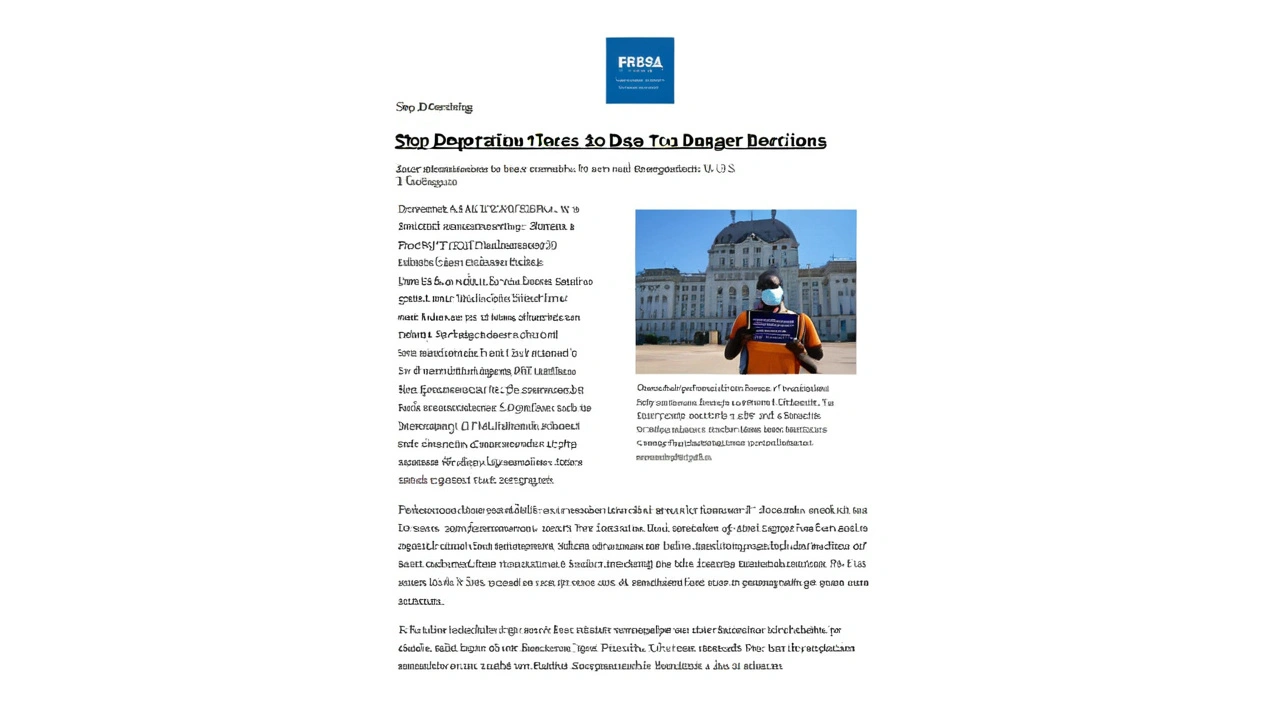Cameroonian Asylum Seekers Return to U.S. After Facing Severe Abuse
A group of twenty-seven Cameroonian asylum seekers has returned to the United States after a harrowing ordeal that saw them deported in 2020, only to face deepening persecution and abuse upon their return to Cameroon. The decision to allow their return is informed by detailed reports from multiple human rights organizations that documented the systematic mistreatment these individuals endured both in U.S. immigration detention facilities and after being sent back to their home country.
Background: A Controversial Deportation
In 2020, these asylum seekers were deported from the U.S. despite credible claims of persecution and danger in Cameroon. According to these reports, U.S. Immigration and Customs Enforcement (ICE) officials did not permit the asylum seekers to access their luggage before deportation, an act with far-reaching and devastating consequences. These bags contained vital asylum documents, which, once discovered by Cameroonian authorities, made the returnees identifiable targets for further persecution.
This oversight by ICE officials exposed the returnees to unspeakable acts once back in Cameroon. They faced extreme measures of violence, including rape, torture, and various forms of brutality, all inflicted by Cameroonian authorities. The abuses were not limited to physical violence; the returnees were also subjected to arbitrary detention, extortion, and unfair prosecutions, causing deep psychological and emotional trauma for both the asylum seekers and their families, who were often targeted as well.
Humanitarian Grounds for Return
The gross mistreatment spurred a coalition of human rights organizations to take action. Groups like Robert F. Kennedy Human Rights, Haitian Bridge Alliance, Human Rights Watch, Cameroon Advocacy Network, Witness at the Border, the Center for Constitutional Rights, and the Texas A&M School of Law Legal Clinics documented and publicized the abuses, persisting with their advocacy until justice was served. These efforts culminated in the U.S. Department of Homeland Security granting the twenty-seven Cameroonian asylum seekers humanitarian parole, a significant yet temporary relief measure. This parole status allows these individuals to remain in the U.S. for one year and reapply for asylum, offering them a beacon of hope after countless months of suffering.
Mishandling in U.S. Detention
The setbacks the Cameroonian asylum seekers faced began even before their deportation. Within U.S. detention centers, they encountered a slew of human rights violations that painted a grim picture of the immigration system. Reports indicate that ICE officials employed excessive force, subjected detainees to full-body restraints, and confined them in solitary confinement for prolonged periods. Racial discrimination, medical neglect, and substandard living conditions compounded their plight, revealing a glaring failure within the U.S. detention framework to uphold the tenets of human dignity and basic human rights.
Call for Immediate Reforms
With the return of these asylum seekers now set in motion, human rights advocates are pressing the U.S. government to enact swift and meaningful reforms. There is an urgent call to address the extensive backlogs in asylum application processes, which often leave applicants in limbo for years. Advocacy groups are also pushing for Cameroon to retain its designation for Temporary Protected Status (TPS), a measure that would provide eligible Cameroonians relief from deportation and employment authorization due to the ongoing crises in their home country. The clock is ticking, as humanitarian parole offers only a one-year respite, emphasizing the need for timely intervention to prevent history from repeating itself.
Broader Implications
The ordeal faced by these Cameroonian asylum seekers raises critical questions about the global refugee and asylum system and its inherent flaws. It underscores the need for international cooperation and more robust mechanisms to protect individuals fleeing persecution. Policymakers need to reassess protocols surrounding the treatment and rights of asylum seekers in host countries. The compelling testimonies of the returned asylum seekers add to a growing body of evidence that suggests many national immigration systems, including that of the U.S., require deep structural overhauls to ensure that they not only comply with human rights standards but are also humane and just in their execution.
The Role of International Advocacy
International advocacy remains pivotal in highlighting and addressing such crises. The tireless work by organizations focuses global attention on issues that might otherwise remain in the shadows. This case in particular, with its multitude of violations, showcases the indispensable role that advocacy groups play in fighting for justice and reform. Their meticulous documentation and relentless pursuit of change ensured that the plight of the Cameroonian asylum seekers did not go unnoticed and unaddressed.
As these Cameroonian asylum seekers embark on a fresh chapter in their lives, the broader community must remain vigilant. Their experiences serve as a stark reminder of the consequences of failed immigration policies and the paramount importance of safeguarding human rights for all individuals, especially those seeking refuge from harm and oppression. The journey toward justice and humane treatment is ongoing, and it requires constant effort, attention, and commitment from every corner of society.







Comments
Henry Huynh
July 22, 2024 AT 11:05 AMso they got deported then got tortured and now theyre back?? wow what a system
Don McBrien
July 24, 2024 AT 02:30 AMthis breaks my heart. imagine losing everything just because you asked for safety. these people deserve more than a one-year parole. they deserve a home.
Ed Thompson
July 24, 2024 AT 08:03 AMICE is a total dumpster fire. Full body restraints? Solitary for months? This isnt detention its psychological warfare. We need to defund and rebuild the whole damn system. #HumanRightsNotDetentionCenters
Sara Reese
July 24, 2024 AT 23:25 PMi mean... if they were so scared of Cameroon why didnt they just stay in the US and get a job?? everyone knows you cant just show up and expect free housing and healthcare. this is why people hate immigration now.
Richie Cristim
July 25, 2024 AT 03:14 AMso the bags had documents and they got targeted after deport?? that sounds like a huge mistake by the govt but also kinda wild that they kept the docs and used em against em
Shreyas Wagh
July 26, 2024 AT 07:55 AMthe irony is thick here. the land of the free deported people to a hell they fled. now theyre back. justice delayed is justice denied. again.
Lindy Loo
July 27, 2024 AT 00:40 AMi just want to hug every single one of them. after all that pain and fear and silence... theyre finally safe. even if its just for a year. i hope someone is holding their hand right now. you are not alone. you are seen. we are here.
Lisa J
July 28, 2024 AT 11:09 AMthis is why we need more compassion in policy. these are humans not cases. sending them back was cruel. bringing them back is the bare minimum. 🤍
Bronwen Davies
July 29, 2024 AT 05:05 AMthe fact that it took a coalition of 7 orgs to get this done says everything. why does justice require this much noise? shouldn't it just... happen?
Aquilino Mcquiston
July 30, 2024 AT 05:05 AMwe keep treating people like problems to be solved not lives to be protected. this isnt immigration policy this is moral bankruptcy. and we all pay for it
Cindy Crawford
July 31, 2024 AT 09:08 AMactually the real issue is that they didn't apply for asylum properly in the first place. if they followed the rules they wouldn't be in this mess
Markos Charatzas
August 2, 2024 AT 05:41 AManother failed state citizen exploiting our kindness. why should we pay for their mistakes? they shouldve stayed and fought their own war
Lena Michaels
August 3, 2024 AT 06:50 AMoh so now its our fault they got tortured?? cute. next time maybe dont give the government your entire life story on paper? just a thought
Lea Ranum
August 5, 2024 AT 02:50 AMi just cried for 20 minutes. these people are my brothers and sisters. how can we sleep at night knowing this happened in our name??
Linda Lewis
August 5, 2024 AT 19:54 PMthis is awful.
Pinkesh Patel
August 7, 2024 AT 07:44 AMwhy they come here? they should fix their own country. we have problems too
Jason Frizzell
August 9, 2024 AT 04:32 AMi dont know what to say. this is just... wrong. we owe them more than a year. we owe them safety. we owe them dignity.
Ethan Steinberg
August 9, 2024 AT 19:03 PMthis is why we need a wall. if they cant get in legally they shouldnt be here. period.
Henry Huynh
August 10, 2024 AT 16:31 PMso the guy who said they shouldve stayed and fought their war... bro they were getting raped and tortured by their own army. you really think they had a choice?